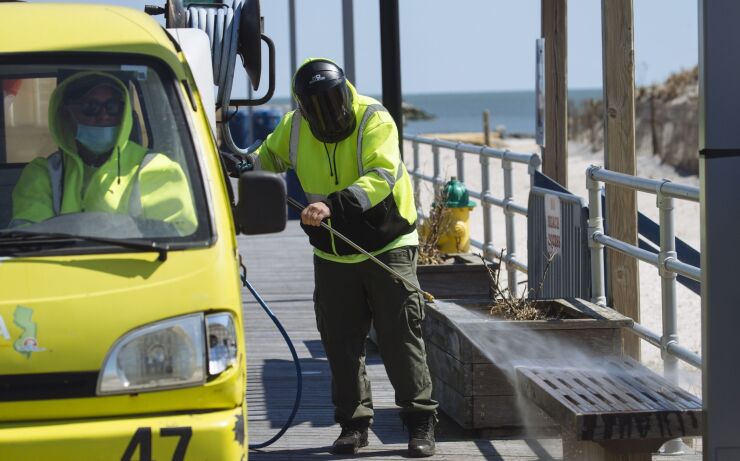New Jersey's financial future, already fragile before the COVID-19 pandemic, is now at a potential breaking point.
The state is staring at large-scale revenue losses from lost sales tax collections after non-essential businesses were shut down under a state of emergency Gov. Phil Murphy declared March 21 to fight the virus.

The Garden State will also take revenue hits from drops in income tax receipts amid rising unemployment, with jobless claims reaching a record 429,000 in mid-April.
Fitch Ratings downgraded New Jersey’s general obligation bonds to A-minus from A on April 21 citing past persistent imbalanced budgets that weakens the state’s ability to combat a serious recession.
“We've entered this crisis with a fiscal peashooter, given the decades — and by the way, both sides of the aisle — decades of fiscal mismanagement of this state in one form or another,” said Murphy about the Fitch downgrade during his April 21 press briefing. “I would love to have a stronger arsenal financially going into not just our administration, but more importantly into this crisis.”
At this point, the state's fiscal problems still take the backseat to the health emergency — according
The state's tough fiscal position is underscored by two unusual moves.
On April 1, the governor and state lawmakers
On April 15, the state received consent from holders of $750 million in tax and revenue anticipation notes to extend the maturity to Sept. 25 from June 25. The state also amended the interest rates on the notes to a fixed rate of 4% from a variable rate.
Moody’s Investors Service analyst Dan Seymour wrote in an April 22 report that New Jersey’s access to capital markets as a tool for managing cash flow disruptions is a “credit positive” while also underscoring challenges many public finance borrowers will be facing in 2020.
“Even the most strained issuers we rate generally have buffers for the next year of debt service,” Seymour said in a statement. “But with broad swaths of the economy shut down, payment defaults, debt service reserve fund draws, and financial difficulties are sure to accelerate."
Moody’s
Murphy
New Jersey finished the 2019 fiscal year with $44.4 billion in outstanding bonded debt, according to the state’s latest debt
The final state budget is expected to differ greatly from the original spending plan Murphy released Feb. 25 to factor in revised revenue estimates and plans for a shortened nine month fiscal year. The Murphy administration
New Jersey entered the sudden economic downturn triggered by COVID-19 with very little budget flexibility despite Murphy's efforts to build up reserves. The state made its first rainy day fund deposit in more than a decade last year and has reserves of nearly $1.3 billion in the current 2020 fiscal year budget. The state had $2.6 billion of reserves in 2008 during the height of the last economic downturn.
Richard Keevey, a former New Jersey budget director and state comptroller, noted that during the last recession period from late 2007 to 2009, state tax revenues fell by nearly $4 billion and took six years to recover to 2008 levels. Keevey, who is now an executive in residence at the Bloustein School of Planning at Policy at Rutgers University, said he expects tax collection decreases to be worse in the wake of COVID-19 and estimates a more than $4 billion revenue shortfall over the next two years.
“The state is looking at how to fill the gap in terms of missed revenue,” said Keevey, who was New Jersey’s budget director and comptroller in the early 1990s. “They are going to be cash-short for a while unless people can get back to work in a hurry.”
Murphy’s initial budget proposal would have boosted pension payments by $729 million and brought the system to 80% of the actuarially determined contribution from its current ADC funding level. The state has struggled with a steep pension burden during the past decade and has been working toward ramping up the system through incremental contribution increases each budget year with the goal of achieving full ADC funding by 2023.
“The state has continued to advance toward full funding of the pension ADC but this commitment strains financial flexibility,” Fitch analyst Marcy Block wrote in a report Tuesday. “The lack of meaningful reserves necessitates a search for outside liquidity support and the scale of the estimated budgetary impact is significant, absent additional federal assistance.”
Regina Egea, president of the conservative-leaning Garden State Initiative, is against the borrowing approach and urges instead that New Jersey find ways to reduce spending at all levels of government. She said the state should explore ways of cutting back on non-essential staff and services along with freezing hiring.
Egea said New Jersey should also seek to improve its tax competitiveness while grappling with economic uncertainties posed by COVID-19. She wants a hard cap of 0% tax growth in the 2021 fiscal year at both the local and state level and a commitment to no new taxes for at least five years.
“How New Jersey recovers from the economic devastation of COVID-19 will set the course for the state’s next decade and can, if we are thoughtful, lead to broad-based economic prosperity,” Egea said.





